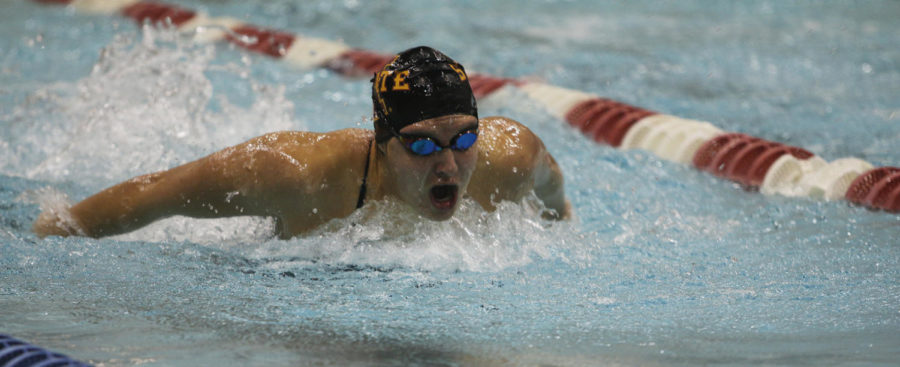Coach calls sprint meet format against Nebraska-Omaha beneficial to ISU swimmers
Hayley Hochstetler/Iowa State Daily
Swimming and diving vs UNO
November 4, 2013
When Iowa State faced off against Nebraska-Omaha this past Friday, Nov. 1, the two teams agreed on using a spring format for the dual meet. In total, there were only eight swimming events, with many of them being short distance races.
The Cyclones (3-0-1, 0-0 Big 12) out-sprinted Nebraska-Omaha (2-5) with a total team score of 123-63.The sprint format, said ISU coach Duane Sorenson, had many benefits.
“The swimmers get a chance to swim in events they never normally get to swim,” Sorenson said.
The six events that almost every swimmer from both teams competed in were the 100 butterfly, 100 backstroke, 100 breaststroke, 100 freestyle, 50 freestyle and 200 individual medley.
Many swimmers also swam in the 200 freestyle relay and 200 medley relay events.
“It was definitely interesting when Duane [Sorenson] walked in on Wednesday and said, ‘By the way, you may be swimming six to eight events this weekend,’” said ISU senior Imelda Wistey of when they learned the format of the meet.
Sorenson also noted the possibility of finding a diamond in the rough. While he didn’t mention any specific examples from this weekend, it is still valuable to give the athletes chances at different events.
“Sometimes somebody really surprises you in a certain event, which can benefit us in the long run,” Sorenson said.
Another benefit of the sprint format is that nearly every swimmer competed in the six individual races, with many competing in a relay event as well.
“It teaches the girls to race when they’re tired,” Sorenson said. “They have to fight the fatigue factor and mentally overcome it.”
Being able to fight fatigue and swim at a high level when they’re tired is pivotal when the grueling Big 12 Championship meet rolls around in late February 2014.
The team decided that it would add up each individual’s time from all six of the individual races to see who swam the fastest overall, which encouraged competitiveness.
Freshman Karyl Clarete was the fastest overall, followed by Wistey, who narrowly edged out freshman Savanna Townsend.
For others, the sprint format didn’t fit their strengths but was still beneficial in the long run.
“The events weren’t my strongest events, but I think the meet helped me mentally,” said Alex Gustafson, who normally swims middle distance events.
Swimming the extra events, as well as a meet that took nearly twice as long as the average meet takes to finish, was mentally and physically draining on the athletes.
“Doing all the events showed everyone how hard they can push,” Gustafson said. “Now when we go back to our regular events we know how much more [effort] we can give.”







